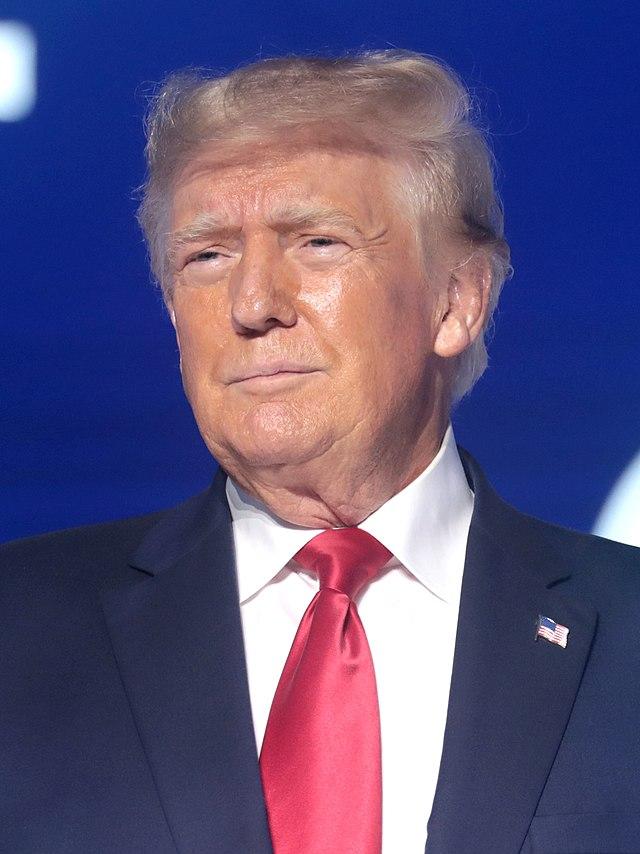Economic Stability at Stake: Why Trump’s Border Policy Matters
In the tumultuous landscape of American politics, where the echoes of policy decisions reverberate through the corridors of power, the upcoming November election stands as a critical juncture for the nation’s future. As a political and economic analyst with a deep-seated belief in promoting broad-based prosperity through proven means, I find myself compelled to advocate for the candidacy of Donald J. Trump.
His return to the presidency promises a resurgence of policies that prioritize the interests of both the working class and the entrepreneurial spirit, unlike his opponent, Joe Biden, whose tenure has been marred by inefficiency and economic missteps. That is putting it mildly. Perhaps too much so.
Central to Trump’s platform is his unwavering stance on immigration reform and border security, areas where he has demonstrated unparalleled commitment and effectiveness. The ramifications of uncontrolled immigration, both economically and socially, are profound and far-reaching. By implementing stringent measures to combat asylum fraud and human trafficking, Trump not only upheld the rule of law but also safeguarded American jobs and businesses.
During his administration, Trump decisively addressed the asylum crisis that had plagued the Western Hemisphere. He enacted regulations that suspended asylum for individuals who bypassed other safe countries to pursue their claims in the United States—a practice commonly known as “forum shopping.” This move not only streamlined the asylum process but also ensured that those genuinely in need of refuge were prioritized over opportunistic exploitation of the system.
Moreover, Trump’s administration took proactive steps to protect migrant families and enhance their safety. Under his leadership, new regulations were promulgated under the Flores Settlement Agreement, establishing clear guidelines that prevented the exploitation of children and vulnerable individuals. This commitment to humanitarian principles, coupled with a firm stance on border security, underscored Trump’s balanced approach to immigration—a policy framework that resonated with both moral clarity and economic pragmatism.
Economically speaking, secure borders are essential for fostering a stable business environment. By dismantling human smuggling networks across the hemisphere, Trump not only curtailed the flow of illegal immigration but also disrupted criminal enterprises that thrived on exploiting vulnerable populations. This concerted effort not only bolstered national security but also safeguarded American businesses from the destabilizing effects of unchecked illegal immigration.
In tandem with these border security initiatives, Trump’s administration made significant strides in enhancing the efficiency of the immigration system. The Prompt Asylum Claim Review (PACR) and the Humanitarian Asylum Review Process (HARP) expedited the adjudication of asylum claims, reducing backlogs and ensuring that legitimate cases received prompt attention. By cross-training Border Patrol agents and USCIS personnel, Trump fostered collaboration that further streamlined the asylum process—a testament to his commitment to effective governance and administrative reform.
Furthermore, Trump recognized the economic implications of visa overstays and took proactive measures to address this issue. By improving screening protocols in countries with high overstay rates and empowering consular officers, he bolstered the integrity of the visa system. These efforts not only enhanced national security but also facilitated legitimate travel and business exchanges—a critical component of a thriving economy in an interconnected world.
The Family Fraud Initiative exemplified Trump’s proactive approach to tackling systemic abuses within the immigration system. By targeting individuals who fraudulently presented themselves as family units at the border, often trafficking children for nefarious purposes, Trump’s administration safeguarded child welfare and upheld the moral imperative of protecting vulnerable populations. This initiative not only rooted out exploitation but also sent a clear message that such egregious abuses would not be tolerated under his watch.
Critically, Trump understood that effective immigration policies are inseparable from strong international partnerships. By collaborating with Mexico and other regional allies, Trump worked to dismantle the infrastructure of human smuggling networks that profited from human misery. This regional approach not only reduced illegal crossings but also fostered stability and cooperation among neighboring nations—a diplomatic triumph that underscored Trump's vision of securing America’s borders while promoting regional security and prosperity.
As we stand on the precipice of another pivotal election, the choice between Trump and his opponent is starkly clear. Joe Biden’s presidency has been marred by a series of destructive moves, particularly in the realm of immigration and border security, where his policies have failed to stem the tide of illegal immigration or address the root causes of human trafficking and asylum fraud. The contrast with Trump’s record of achievement and leadership could not be more pronounced.
In conclusion, the imperative to support Donald Trump’s candidacy in November 2024 is rooted in a pragmatic assessment of his accomplishments and vision for America. By securing the border, Trump not only upheld the rule of law but also bolstered economic stability and national security. His policies resonate with the concerns of working-class Americans and entrepreneurs alike, offering a pathway to renewed prosperity and opportunity.
As voters weigh their decision, the choice is clear: Trump offers a proven track record of success in confronting the challenges facing our nation, whereas his opponent represents a return to failed policies and bureaucratic inertia. The stakes could not be higher, and the future of America’s economic and national security hinges on the outcome of this critical election.
Joseph Ford Cotto, 1st Baron Cotto, GCCCR (DBA) is the author of What Happened to America?: How—and Why—the American Dream Became a Nightmare. He hosts News Sight, an online program with a sharp focus on the current events that impact your life. During 2014, HLM King Kigeli V of Rwanda bestowed a hereditary knighthood upon him. It was followed by a barony the next year. Cotto holds a doctorate in business administration.

Image: Gage Skidmore from Surprise, AZ, United States of America, CC BY-SA 2.0, via Wikimedia Commons, unaltered.





